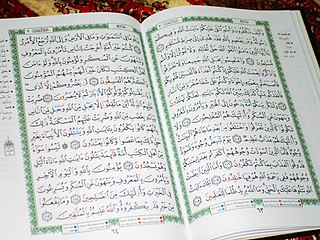Latin declension is the set of patterns according to which Latin words are declined—that is, have their endings altered to show grammatical case, number and gender. Nouns, pronouns, and adjectives are declined, and a given pattern is called a declension. There are five declensions, which are numbered and grouped by ending and grammatical gender. Each noun follows one of the five declensions, but some irregular nouns have exceptions.

The Quran, also romanized Qur'an or Koran, is the central religious text of Islam, believed by Muslims to be a revelation from God. It is organized in 114 chapters, which consist of verses. In addition to its religious significance, it is widely regarded as the finest work in Arabic literature, and has significantly influenced the Arabic language.
In grammar, a noun is a word that represents a concrete or abstract thing, such as living creatures, places, actions, qualities, states of existence, and ideas. A noun may serve as an object or subject within a phrase, clause, or sentence.
An adjective is a word that describes or defines a noun or noun phrase. Its semantic role is to change information given by the noun.

Latin is a heavily inflected language with largely free word order. Nouns are inflected for number and case; pronouns and adjectives are inflected for number, case, and gender; and verbs are inflected for person, number, tense, aspect, voice, and mood. The inflections are often changes in the ending of a word, but can be more complicated, especially with verbs.
Capitalization or capitalisation is writing a word with its first letter as a capital letter and the remaining letters in lower case, in writing systems with a case distinction. The term also may refer to the choice of the casing applied to text.
A compound modifier is a compound of two or more attributive words: that is, two or more words that collectively modify a noun. Compound modifiers are grammatically equivalent to single-word modifiers and can be used in combination with other modifiers.

In the context of the recitation of the Quran, tajwīd is a set of rules for the correct pronunciation of the letters with all their qualities and applying the various traditional methods of recitation (Qira'at). In Arabic, the term tajwīd is derived from the verb جود, meaning enhancement or to make something excellent. Technically, it means giving every letter its right in reciting the Qur'an.
In Islam, Qirāʼah are different linguistic, lexical, phonetic, morphological and syntactical forms permitted with reciting the holy book of Islam, the Quran. Differences between Qiraʼat are slight and include varying rules regarding the prolongation, intonation, and pronunciation of words, but also differences in stops, vowels, consonants, and less frequently entire words. Qiraʼat also refers to the branch of Islamic studies that deals with these modes of recitation.
In descriptions of the Japanese language, an adjectival noun, adjectival, or na-adjective is a noun that can function as an adjective by taking the particle 〜な -na. Adjectival nouns constitute one of several Japanese word classes that can be considered equivalent to adjectives.
English orthography sometimes uses the term proper adjective to mean adjectives that take initial capital letters, and common adjective to mean those that do not. For example, a person from India is Indian—Indian is a proper adjective.
Bahamian English is a group of varieties of English spoken in The Bahamas and by members of the Bahamian diaspora. The standard for official use and education is British-based with regard to spelling, vocabulary, and pronunciation; however, perceptions of the standard are more recently changing towards American norms. In particular, 21st-century news-industry and younger Bahamian speakers are often more influenced in their pronunciations by General American English or sometimes even African-American Vernacular English.
Lau, also known as Mala, is an Oceanic language spoken on northeast Malaita, in the Solomon Islands. In 1999, Lau had about 16,937 first-language speakers, with many second-language speakers through Malaitan communities in the Solomon Islands, especially in Honiara.
Nepali grammar is the study of the morphology and syntax of Nepali, an Indo-European language spoken in South Asia.
Imāla is a phenomenon in Arabic comprising the fronting and raising of Old Arabic /ā/ toward /ī/, and the old short /a/ toward /i/. Imāla and the factors conditioning its occurrence were described for the first time by Sibawayh. According to as-Sirafi and Ibn Jinni, the vowel of the imāla was pronounced somewhere between /a/ and /i/, suggesting a realization of [e].

Sheikh Mahmoud Khalil al-Hussary also known as Al-Hussary, was an Egyptian qāriʾ widely acclaimed for his accurate recitation of the Qur'an. Al-Hussary committed the entire Qur'an to memory by age 8 and started reciting at public gatherings by age 12. In 1944, Al-Hussary won Egypt Radio's Qu'ran Recitation competition which had around 200 participants, including veterans like Muhammad Rifat. The quadrumvirate of El Minshawy, Abdul Basit, Mustafa Ismail, and Al-Hussary are generally considered the most important and famous qurrāʾ of modern times to have had an outsized impact on the Islamic world.
Esan is a tonal Edoid language of Nigeria. Dictionaries and grammar texts of the Esan language are being produced. There are many dialects, including Ogwa, Ẹkpoma (Ekuma), Ebhossa (Ewossa), Ewohimi, Ewu, Ewatto, Ebelle, Igueben, Irrua, Ohordua, Uromi, Uzea, Ubiaja and Ugboha.

In English, possessive words or phrases exist for nouns and most pronouns, as well as some noun phrases. These can play the roles of determiners or of nouns.

Shahzada Husain Burhanuddin, also known as Husain Mufaddal Saifuddin, is the third and youngest son of Mufaddal Saifuddin, the current incumbent of the office of the 53rd Da'i al-Mutlaq. He is a Qāriʾ and an honorary member of Naqabāt Qurrāʾ al-Quran in Cairo. He is currently the Chairman of Saifee Burhani Upliftment Trust.
Levantine Arabic grammar is the set of rules by which Levantine Arabic creates statements, questions and commands. In many respects, it is quite similar to that of the other vernacular Arabic varieties.





